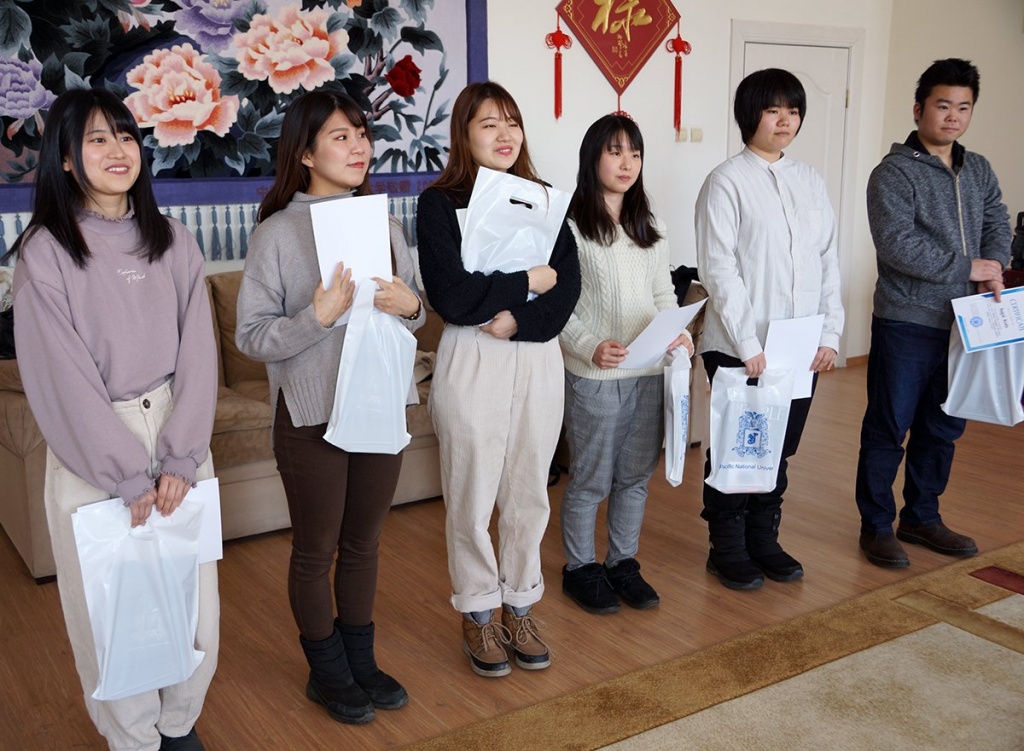The first Winter School of the Russian language was held for Japanese citizens at Pacific State University (Khabarovsk). At the request of students, the opening of the Winter School was timed to coincide with the Russian winter holiday - Maslenitsa. The students used their spare time to get acquainted with the sights of the Khabarovsk Territory.
Photo credit: pnu.edu.ru
Pacific State University, which includes the Khabarovsk branch of the Asian-Pacific Association of Teachers of Russian Language and Literature, has been organizing educational and cultural events for Japanese citizens for more than 10 years in both countries. They include short-term (up to four weeks) Russian summer schools for students of University of Niigata Prefecture, Kansai University and the residents of Tokyo. The language courses are carried out by teachers of the Department of Russian Philology of the Pacific State University under the direction of Doctor of Philology, Professor Luidmila Krapivnik.
The purpose of the program is the development of language skills and acquaintance with the culture and history of the Far East of Russia, so the program includes two components - the training (4 hours of classes five times a week) and tours (students visit the sights of Khabarovsk and the Khabarovsk Territory, as well as industrial enterprises of the city). At the request of Japanese partner universities this year, the first Winter School was organized during vacations to coincide with the celebrations of Maslenitsa.
The program prepared for the Japanese students is quite intense, it is focused on the expansion of language knowledge, and the formation and improvement of language skills. The teachers take into account the fact that the students of the school arrive after the end of the semester in Japan, therefore, they use active and interactive forms of instruction. The learning process is focused on abundant speech practice, as well as video courses and a variety of music classes, such as the reinforcing of language skills (musical phonetics) and acquaintances with Russian musical culture (both folk and modern popular songs). Such a diverse program contributes to a more effective study of the language and achieving the maximum result in a short time. It also arouses interest in the further study the Russian language and Russian culture.
The Japanese students noted the high quality of classes, the ability to put into practice the knowledge of different languages (Russian, English), the warmth, kindness and responsiveness of university teachers and staff participating in the program, as well as the Russian students, who were in charge of their stay in Khabarovsk and organizing excursions. They say that they are grateful to the Winter School not only for the new knowledge and impressions, but also for new wonderful Russian friends.
The importance of the event was also noted by Alexander Zubritsky, the head of the Far East Branch of the Russkiy Mir Foundation: “Pacific State University, without exaggeration, is one of the leading universities in the Russian Far East and in the Asia-Pacific region, where Russian studies and Russian as a foreign language are developed. Thanks to the great work of the university, Russia has partnerships regarding the methods of teaching Russian as a foreign language with such major universities abroad as Kansai, Changchunsii and Niigata universities. ”
The winter school is not finished yet, but the teachers of the Pacific State University are already preparing to host new students of the Summer School and continue their joint educational and cultural activities in the Russian language and culture together with the Russkiy Mir Foundation - the cooperation agreement was concluded on January 15, 2020.
Anastasia Pys








